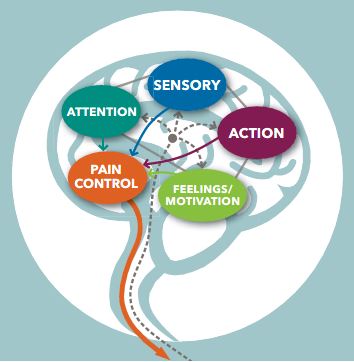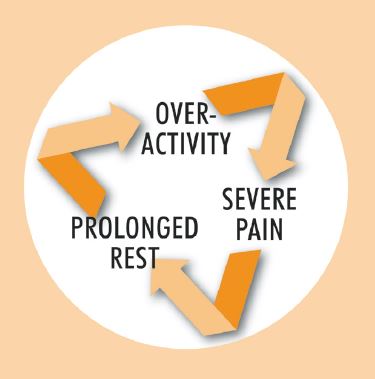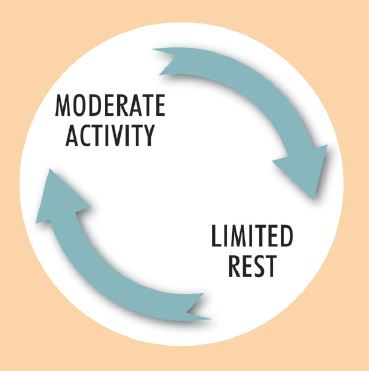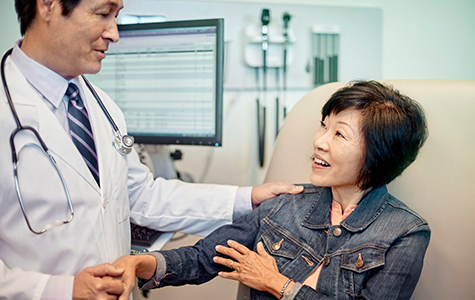Pain
Take charge of your health.
Taking an active role in your health can help you feel better — and become better equipped to deal with life’s ups and downs. Learn different strategies to manage your pain and improve your ability to function.

What’s The Difference Between Acute And Chronic Pain?
Pain usually starts when nerves send signals to your brain, telling it you have an injury or illness.
Acute pain doesn’t last long. It may result from an injury or illness.
With chronic pain, your body might heal but your brain keeps getting “pain signals.” The pain becomes persistent. Chronic pain is often “invisible.” You might look healthy to others, while still suffering from extreme pain.
Watch this video about the brain-pain connection, and how to tackle chronic pain.
What Happens When You Feel Pain?
Pain signals from the body do not go to a single location in the brain. Instead, they go to several different networks of brain cells. The networks work together to determine how you experience the pain.

- Attention: Controls how much attention you direct toward and away from pain.
- Sensory: Processes the location and intensity of pain and whether pain is sharp, dull, or burning.
- Action: allows you to respond to pain with your behavior.
- Feelings/motivation: Influences how unpleasant and threatening pain is by processing related thoughts, feelings (fear, anger, depression), and stress responses.
- Pain control: Takes messages from the other brain networks and controls your experience of pain by producing natural painkillers called endorphins. This network sends signals from the brain down into the spinal cord and out to the body.
How Can I Help Myself?
You can help yourself with chronic pain. Start by listening to your body!
A few things to try include:
- Getting enough sleep
- Deep breathing
- Exercising
- Getting encouragement and tools with online wellness programs that help you create positive changes in your life
- Following all care instructions from your person doctor
Kaiser Permanente members have access to digital mental health and wellness tools at no charge. Check out this page. You also can call a health coach for 6-month subscriptions to Whil, SilverCloud, Woebot, or Thrive.
Stop And Breathe
Whenever you feel like you need to catch your breath, do this 30-second breathing exercise for instant relaxation.
Activity-Rest Cycle
Being active is important. It can be an effective way to manage pain. One thing that is even more important is how you balance activity with rest. Check out these two models that describe what this can look like

You might sometimes find yourself overdoing activities to “catch up” after periods of restricted activity. This can result in severe pain, which then may force you to rest for even longer periods, creating a pain overactivity cycle.
The activity-rest cycle is a better way to increase the amount of activity you can do over time.

To use this cycle, first identify an activity you tend to overdo. Then decide how long you can do the activity before you need to stop, rest, relax, and restart.
Common Chronic Pain Conditions
While the cause of chronic pain can vary, there are some common pain conditions. Learn more about each:
- Arthritis and joint pain
- Fibromyalgia
- Back pain
- Headaches
- Chronic pelvic pain
- Groin pain
- Nerve pain (neuropathy)
Check out these videos on symptoms, treatment, and prevention of:
Could A Health Coach Help Me?
Sometimes, we all need a little help as we’re dealing with health conditions. As you work to manage chronic pain, a health coach can help you work towards your goals, find new coping strategies, and keep on track.
Learn more about Kaiser Permanente’s health coaching sessions.
Your Total Health
Remember, your well-being is affected by both your mind and your body. It’s important to take good care of both to have complete health.
Learn how to care for the whole you.
Can Pain Cause Depression?
It’s not unusual for mental health problems to occur with long-term physical problems. Chronic pain sufferers often feel isolated by their conditions, which can lead to depression. Learn more about this topic.
Making A Plan
A pain management plan can help relieve symptoms. It can include medication, massage, counseling, tai chi … whatever you find helps.
Work with your personal doctor on your plan. A doctor who not only knows your medical history but understands what’s important to you may be the resource you need most.
Looking For More?
If you’re a Kaiser Permanente Northwest member, you can discuss treatment needs or set up an appointment by calling the Kaiser Permanente Mental Health Department, 503-249-3434 or 1-855-632-8280.



